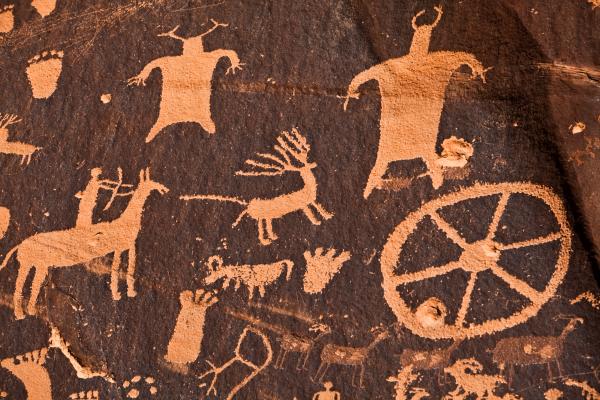Bringing People Back into the Economy

Work is energy. Two crises of our times are intimately connected — the climate crisis and the unemployment crisis.
As long as we address these crises separately, we will not solve either. The climate crisis is normally addressed scientifically in diagnosis and economically in terms of solutions. However, economic solutions are offered only within the global market and commodification paradigm. The most recent example of this is the Stern report [a 700-page report by economist Lord Stern of Brentford for the British government on the effect of climate change on the world economy]. In it, people do not figure anywhere. However, substituting the work of people with work done by machines running on fossilized carbon is a major contributor to the pollution of the atmosphere and the climate crisis. Bringing work to people and people to work can be a significant solution of the crisis of human disposability and the crisis of climate disruption.
As the fossil fuel economy has grown, it has substituted energy for humans. On the one hand, this has rendered humans redundant to the economic enterprise of production. It has created the crisis of poverty and unemployment, of dispensability and disposability. On the other hand, it has led to the problem of carbon pollution. Whereas humans are sustained by renewable carbon embodied in plants and biomass, industrial energy consumes fossil fuel, adding more CO2 to the atmosphere than the planet can recycle.
Industrialization replaces renewable energy of humans and other animals with non-renewable energy. Even though industrial production requires more resources than feeding humans, replacing people with fossil fuel-driven machines is defined as a gain in productivity.
Scientific and technological progress is guided by this narrow and distorted concept of productivity, which externalizes the social costs of livelihood destruction and the ecological costs of ecosystem destruction.
Economic policy seeks to subsidize the spread of industrialization and fossil fuel addiction. Thus, fertilizers are subsidized in industrial agriculture and exports are subsidized in global food systems. Petrochemicals are subsidized; coal and oil are subsidized. Besides the direct financial subsidies are indirect subsidies such as funding the construction of the massive infrastructure for the fossil fuel economy, such as highways. The ultimate subsidy to the fossil fuel economy is militarized support for the extraction of fossil fuels, with the oil wars being an example. Socially, ecologically, and economically high-cost systems of food production, energy production, and transportation are made artificially cheap. Subsidies for globalized, industrialized food make local, organic food appear more expensive; subsidies for private cars and air travel make train travel appear more expensive; subsidies to supermarkets make local shops appear more expensive. These economic distortions lead to social and cultural distortions. Creative and productive human beings are laid to waste, and creative work is perceived as second-class work, as obsolete. Craftspeople are expected to disappear for industrialized production of petro-products; small farmers are expected to disappear to make way for industrial agriculture. And with the disappearance of creative work comes the disappearance of the very knowledge and skills we need to shape economics beyond oil.
Shifting the way we perceive work
We need to shift the way we define and perceive physical work. Replacing people has been defined as liberating people from work. Physical work has been defined as drudgery and as degrading. When the Communist government of West Bengal passed a law to ban hand rickshaws, it justified it on the grounds that it was putting an end to "degrading" work. The rickshaw pullers organized protests and said there was nothing degrading in their work. In fact, it is being without work that is degrading. When Monsanto introduced Roundup, a broad-spectrum herbicide that "kills everything green that comes in contact with it," it proclaimed it was liberation from weeding. Destroyers of work and employment always present destruction as liberation. Yet there is no liberation in being robbed of one's productive capacity. There is no dignity in being treated as disposable.
To make the energy transition beyond oil, we need to bring people back into the economy, bring human energy back into production, respect physical work, and give it dignity. Climate change is giving us adequate warning that substituting people with fossil fuel is ecologically non-sustainable. Social and cultural breakdown should likewise be recognized as a warning about the social non-sustainability of displacing people from work.
There are multiple levels at which the human capacity to do work needs to be put back into the energy equation and into human destiny. First is the internal energy of human beings in all its dimensions – spiritual, cultural, emotional, intellectual, and physical. If it is tapped, this is the largest energy source we have – inexhaustible, replenishable, and ever enlarging. Human energy, combined with the energy of the sun, the plants and animals, the wind, the air, the sea and water, the soil and the earth, is both the basis of work and livelihoods and the source of sustainable and renewable energy.
Entropy and emergence
In the larger ecological context, mechanistic growth based on mechanical engineering is leading to impoverishment, both material and spiritual. It is entropic growth – growth that increases waste and pollution. Climate change is, in fact, a result of increasing pollution and increasing entropy.
In The Entropy Law and the Economic Process, Nicholas Georgescu-Roegen, a former professor at Vanderbilt University and the inspiration for all ecological economists, wrote: "Neoclassical economics is mechanistic, like classical mechanics is. It can neither account for the existence of enduring changes in nature nor accept this existence as an independent. Nature on which the economic enterprise and industrial enterprise rests is totally discounted. Neoclassical economists left nature out of their calculus because the "no deposit, no return" analogue befits the businessmen's view of economic life. For if one looks only at money, all he can see is that money just passes from one hand to another: except by a regrettable accident it never gets out of the economic process."
The mechanistic worldview and the industrialization process have promoted the overextraction and overconsumption of resources, and yet it externalizes the energy and resources it uses, as well as the waste and pollution it generates, from the calculus of productivity and profit. This has led to three interrelated effects: the exhaustion of natural resources; the build-up of pollution; and the destruction of people, communities, and cultures.
While the dominant paradigm can ignore the creation of waste, the human activities that it is promoting are subject to the law of entropy. The term "entropy" was first introduced by German physicist Rudolf Clausius more than 100 years ago. Essentially it describes the movement of any system toward disorder.
Georgescu-Roegen illustrates entropy with a simple example of coal being used to run a railway engine. The burning coal creates steam, which runs the engine, and makes the train move. This conversion of coal, into motion on the one hand, and ashes on the other, is subject to the first law of thermodynamics – the conservation of matter and energy. But there is another change taking place, which is governed by the law of entropy, or the second law of thermodynamics. As Georgescu-Roegen writes: "At the beginning of the process before burning, the chemical energy of the coal is free, in the sense that it is available to us for producing some mechanical work. In the process, however, the free energy loses this quality, bit by bit. Ultimately, it always dissipates completely into the whole system where it becomes bound energy; that is energy that we can no longer use for the same purpose."
Entropy is a measure of the bound energy of a system. In a system with a high level of entropy, most or all of its energy is bound; in one with a low level of entropy, the opposite is true. The degradation of energy from free to bound has also been referred to as a turning of order into disorder. In an ordered structure, energy is free, while a structure with bound energy is chaotic and disordered.
Life has the capacity to oppose the qualitative degradation to which inert matter is subject. In fact, life may be characterized as the capacity to create order, to create free energy, to create diversity, and to evade the law of entropy.
Georgescu-Roegen has called the principle that allows life to create new patterns "the principle of emergence of novelty by combination." Living energies allow us to break out of the predictable destructiveness and dissipation inherent to mechanical energy. They create new material possibilities for well being without ecological destruction. We become cocreators or co-producers with nature's creative renewing processes.
Reductionism, which focuses only on plans, cannot see or understand the unexpected creativity of natural processes. The unexpected, orderly patterns created from disorderly elements are known as emergent properties. As eminent development biologist Brian Goodwin points out: "It is now recognized that emergent properties are very widespread in nature, particularly in living systems. Many of the most intriguing characteristics of life, such as the way a complex organism emerges from the interaction of many cells during embryonic development, or the pattern of species extinctions during evolution, are unexpected results of particular patterns of interaction between components in complex systems."
Such emergence is characteristic of all living systems. When society is organized on the basis of the living energy of its citizens, living democracy is an emergent phenomenon, making the impossible possible, creating hope out of hopelessness, unleashing our creative energies in the midst of ecological and social ruin.
Human beings, as living beings, have a choice between two alternatives – the entropic option or an emergent option. The former locks us in a mechanical worldview, based on mechanistic science, mechanical production, and a mechanistic economics whose myth of perpetual growth leads us to death, decay, and disintegration. The latter relies on ecological science, ecological production, and ecological, living economies that provide new levels of human enrichment through biological and cultural diversity. The choice we make will decide whether or not we survive as a species. And the possibilities are not restricted by the present range of choices; in society, too, there are emergent properties, unpredictable forms that emerge through new associations, new networks, and new solidarities.
The high-entropy journey humanity has undertaken under the illusion of growth and progress does not have a future. We will have to change the road we are on, and we will have to change our goals. The goals cannot be set by reductionist science, industrial technologies, and neoliberal economies. The goals cannot be narrowly defined as economic growth or consumerism. The goals have to be the preservation of the earth, her diverse species, and future generations.
The multiple crises of climate insecurity, energy insecurity, and food insecurity create an imperative and an opportunity to transcend the limits of the mechanistic-industrial-capitalist paradigm that has been systematically shrinking our potential even as it peddles progress.
The paths out from this crisis are not being blazed in the boardrooms of the global corporations who dominate our world today and are largely responsible for crimes against nature and humanity. Industrialization of food and agriculture has put the human species on a slippery slope of self-destruction and self-annihilation. The movement for biodiverse, ecological, and local food systems simultaneously addresses the crises of climate, energy, and food. Above all, it brings people back into agriculture and reclaims food as nourishment and the most basic source of energy. New ways of thinking and acting, of being and doing, are evolving from the creative alternatives being employed in small communities, on farms, and in cities.
It is this renewable energy of ecology and sharing, of solidarity and compassion, that we need to generate and multiply to counter the destructive energy of greed that is creating scarcity at every level – scarcity of work, scarcity of happiness, scarcity of security, scarcity of freedom, and even scarcity of the future.
Climate chaos, brutal economic inequality, and social disintegration are jointly pushing human communities to the brink. We can either let the processes of destruction, disintegration, and extermination continue unchallenged, or we can unleash our creative energies to make systemic change and reclaim our future as a species, as part of the earth family. We can either keep sleepwalking to extinction or wake up to the potential of the planet and ourselves.
From Soil Not Oil: Environmental Justice in an Age of Climate Crisis (Copyright © 2008 by Vandana Shiva.) Reprinted by permission of South End Press, Cambridge, Mass. Visit South End's website at www.southendpress.org.



